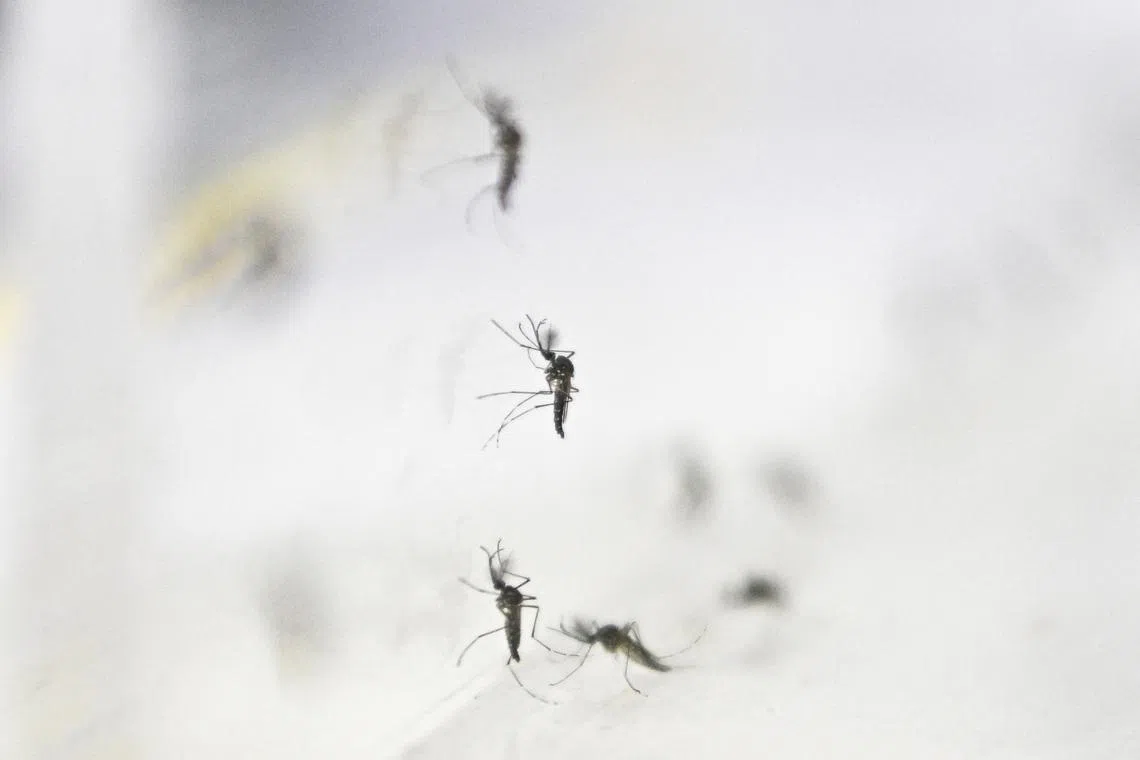Woman fined for allowing mosquitoes to breed in toilet bowl blames the insects
Sign up now: Get ST's newsletters delivered to your inbox

Koh Ee Sian said that as the mosquitoes “just flew in”, she could not be held responsible for their breeding.
PHOTO: ST FILE
Follow topic:
SINGAPORE – A woman was fined $1,400 for allowing mosquitoes to breed in her toilet bowl, despite her efforts during a trial to push the blame on the insects.
Koh Ee Sian contested one charge of creating conditions favourable for mosquito breeding in the toilet bowl.
The mosquitoes were found after an inspection at her Housing Board block by National Environment Agency (NEA) officers in May 2022.
District Judge Brenda Chua, in her judgment on the case dated Dec 22, said: “This was a case where the accused operated under the notion that what was left untouched was not her responsibility.
“Going by the accused’s reasoning, this would mean household owners would never be responsible for mosquito breeding, so long as they do not touch the water in receptacles or containers. If that were the case, mosquitoes would be left to breed rampantly in households.”
The judge said Koh had also attempted to absolve her responsibility by blaming NEA for its failure to inform the public that mosquitoes could breed in a toilet bowl.
“To this, I highlight that NEA’s messaging to the public has been consistent and clear – that is, mosquitoes breed in stagnant water,” she added.
According to the judgment, Koh, who represented herself during the trial, has paid the fine and has also appealed against her conviction and sentence.
The court documents state that two NEA officers went to Koh’s block on May 9, 2022, to inspect the units, following a dengue outbreak in the estate. The location of the block was not mentioned.
They found mosquito breeding in Koh’s master bedroom toilet bowl and a sample was collected in her presence.
A scientific analysis by an Environmental Health Institute analyst found Aedes larvae.
According to the NEA officers who visited Koh’s unit, one of them had asked her for Dettol or Clorox to destroy the breeding.
After she said she did not have either, the officer asked her if she had boiling water. Koh handed a kettle to the officers, but one of them had to boil the water on her own as Koh said she is a Buddhist and does not kill animals.
The officer then poured the hot water into the toilet bowl and asked Koh to flush it 15 to 30 minutes later.
Koh said during the trial that after she moved into the unit on May 6, 2022, she used only the kitchen toilet.
Her position was that no one used the master bedroom toilet and that she “didn’t give any permission for the mosquitoes to come into (and) breed in (the) toilet bowl”.
She said that as the mosquitoes “just flew in”, she could not be held responsible for their breeding in the unit.
The judge said that “the accused effectively attributed the offence to the mosquitoes, and not herself”, adding that she rejected this purported justification.
Koh also claimed that she was not aware that the water in the master bedroom toilet bowl was stagnant.
The judge rejected this point as well.
With Koh having said she left the master bedroom toilet untouched, the judge said it followed that the water in the master bedroom toilet bowl would be stagnant if the master bedroom toilet bowl was not cleaned or flushed regularly.
Koh had also said she had done what she could to prevent mosquitoes from breeding in her unit by following NEA’s dengue home guidelines and checklist on actions to take, to prevent mosquito breeding in homes.
As toilet bowls are not listed in the checklist, she said the public would not know that they need to check the toilet bowls for mosquitoes as they were not a very conspicuous or obvious thing to check. She also highlighted that even though toilet bowls could be seen in the graphics on the guidelines, nothing was said about them.
The prosecution from NEA said Koh’s argument on the checklist was absurd, and that she attempted to evade her responsibility, adding that the guidelines are a general advisory and non-exhaustive.
The judge said the material clearly informed the reader to remove all stagnant water.
For the charge under the Control Of Vectors and Pesticides Act 1998, Koh could have been fined up to $5,000 and jailed for up to three months or both.
There were 32,325 dengue cases recorded in 2022 – the second-highest number of cases in a year.
According to the NEA website, there have been 9,676 cases in the first 51 weeks of 2023.


